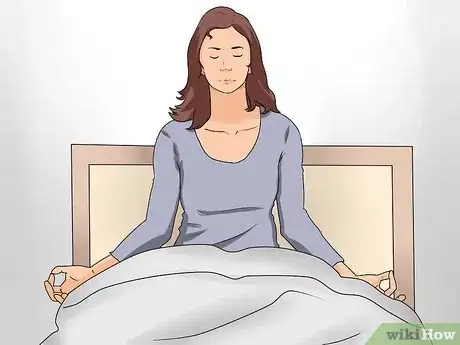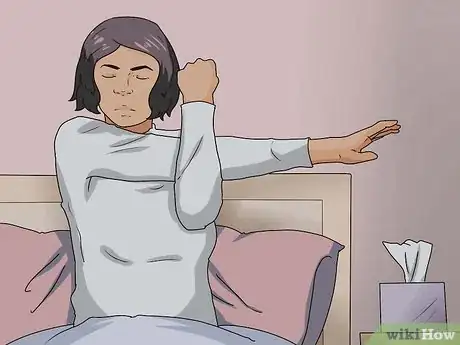This article was co-authored by David Nazarian, MD. Dr. David Nazarian is a board certified Internal Medicine Physician and the Owner of My Concierge MD, a medical practice in Beverly Hills California, specializing in concierge medicine, executive health and integrative medicine. Dr. Nazarian specializes in comprehensive physical examinations, IV Vitamin therapies, hormone replacement therapy, weight loss, platelet rich plasma therapies. He has over 16 years of medical training and facilitation and is a Diplomate of the American Board of Internal Medicine. He completed his B.S. in Psychology and Biology from the University of California, Los Angeles, his M.D. from the Sackler School of Medicine, and a residency at Huntington Memorial Hospital, an affiliate of the University of Southern California.
There are 12 references cited in this article, which can be found at the bottom of the page.
wikiHow marks an article as reader-approved once it receives enough positive feedback. In this case, several readers have written to tell us that this article was helpful to them, earning it our reader-approved status.
This article has been viewed 176,138 times.
Being sick can be a difficult time. You might not feel like doing much on a sick day, but a few activities can help you make the most of it. A sick day can be a great opportunity to relax and focus on your health. Take the day for yourself and focus on things you enjoy as you recover from your illness.[1]
Steps
Enjoying Your Sick Day
-
1Meditate. Meditation has been clinically shown to reduce stress and anxiety, which in turn can lead to an improvement in health and immune system function. If you are feeling well enough, try getting a good meditation session and enjoy the benefits that it can bring. Here are some easy ways to get started:[2]
- Take deep breaths and keep your focus on those breaths. If your mind wanders, return your focus to your breathing.
- Examine your body and notice how each part feels. If you find any areas of discomfort or tension, you can imagine them beginning to feel more relaxed.
- Read or listen to an important passage, poem, or song lyric. Take a few moments to reflect upon the meanings it holds for you.
-
2Laugh. Even though you might not feel well, getting some laughs in can help boost your immune system and might make you feel better. Laughing has been shown to reduce stress levels and increase your bodies natural killer cells that fight of invading cells.[3]
- Watch your favorite funny movie or television show.
- Listen to a comedy show or your favorite comedy podcast.
- Read a book that always makes you laugh.
Advertisement -
3Talk with a friend or loved one. Use some of your free time to call up someone you love chatting with. Having a great conversation with a friend or family member has been proven to raise levels of oxytocin, which can help with healing and well being.[4]
-
4Do something you love. Take some time for yourself during your sick day and do some light activity you enjoy. This can help take your mind off being sick and can improve your mood. Try some of the following examples to make your sick day an enjoyable one:
- Listen to music.
- Play a board or video game.
- Do your favorite craft or art if you feel well enough.
- Plan a future vacation.
-
5Get in some light exercise. If you have a cold, you might want to try getting some exercise in during your sick day. Listen to what your body is telling you if you do exercise. Don't over do it and stop if you feel worse.[5]
- Light exercise can alleviate some symptoms such as congestion.
- Exercise is fine if the only symptoms you have are a runny nose, congestion, or sneezing.
- Do not exercise if you have any symptoms in your chest, like coughing, wheezing, fever or muscle aches.
- Stop immediately if you start to feel worse.
Improving Your Condition
-
1Get some rest. Chances are if you're sick, you're feeling tired. Energy levels can drop when you're not feeling well and you might feel like sleeping on your sick day. This natural immune response means a sleep requirement for good health.[6] Use your sick day as an opportunity to catch up on lost sleep and start to feel better.[7]
- Take as many naps as you need during the day.
- Don't try to stay up late. Go to bed early and get a good night’s sleep.
-
2Enjoy a bath or shower. Depending on your symptoms, a bath or shower can help you feel better. Both hot and cold showers will have different effects and should be used in different cases. Review the following information to learn when you should use hot or cold water: [8]
- Hot water can help relax and ease muscle or joint pain. It may also help with de-congestion.[9]
- Cool or lukewarm showers and baths can help reduce swelling and can lower a high fever.
- Very cold showers can actually raise your temperature due to shivering.
- Never take a hot shower or bath if you have a fever as this can raise your temperature to dangerous levels.
-
3Make sure to eat something. Although you may not have a big appetite when you are sick, you still need to eat and maintain caloric energy. Eating can help you recover from your illness and can even reduce stress. Make yourself something tasty to start feeling better.[10]
- Carbohydrates are important when you are sick and you'll want around 150 grams of them per sick day.
- Half a cup of apple juice can have up to 15 grams of carbohydrates.
- Half a cup of sorbet will give you around 30 grams of carbohydrates.
- Try to eat around six small meals per sick day, instead of the usual big three.
- Don't eat anything too heavy, greasy, or spicy if you have nausea or have been vomiting.
-
4Stay hydrated. Some symptoms can cause you to become dehydrated during your sick day. Fever, diarrhea, vomiting, or frequent urination are all contributors to becoming dehydrated.[11] Make sure you drink plenty of fluids on your sick day and stay hydrated.[12]
- Drink plenty of water during the day.
- Avoid fruit juices or coffee as these can make diarrhea worse.
-
5Get some sun. Exposure to natural and direct sunlight has been shown to improve overall health.[13] By going outside into the sunlight, you can start to gain the health benefits that ultraviolet light can bring.[14]
- Exposure to sunlight can increase production of vitamin D in the body. Vitamin D is important to many of the body's functions.
- Getting some sun can help regulate the sleep/wake cycle and let you get the most out of your rest.
- Short and repeated exposure works best, bringing the benefits of sun exposure while mitigating the hazards.
- Any UV index above 3 requires sun protection.
Warnings
- Monitor your symptoms. Visit a doctor if you begin to feel worse.⧼thumbs_response⧽
References
- ↑ https://wellbeing.uw.edu/self-care-for-cold-symptoms/
- ↑ https://nccih.nih.gov/health/meditation/overview.htm
- ↑ https://www.helpguide.org/articles/mental-health/laughter-is-the-best-medicine.htm
- ↑ https://www.heretohelp.bc.ca/let-friend-help-you-through-stress
- ↑ https://nyulangone.org/news/when-its-safe-exercise-after-getting-sick
- ↑ David Nazarian, MD. Diplomate, American Board of Internal Medicine. Expert Interview. 26 March 2020.
- ↑ https://www.cdc.gov/coronavirus/2019-ncov/if-you-are-sick/steps-when-sick.html
- ↑ https://uhs.berkeley.edu/health-topics/colds-and-respiratory-infections/cold-care
- ↑ https://www.nhs.uk/conditions/back-pain/treatment/
- ↑ https://medlineplus.gov/ency/patientinstructions/000122.htm
- ↑ David Nazarian, MD. Diplomate, American Board of Internal Medicine. Expert Interview. 26 March 2020.
- ↑ https://www.up.edu/healthcenter/primary-care/self-care.html
- ↑ David Nazarian, MD. Diplomate, American Board of Internal Medicine. Expert Interview. 26 March 2020.
- ↑ https://www.nice.org.uk/guidance/ng34/chapter/1-Recommendations









































































Medical Disclaimer
The content of this article is not intended to be a substitute for professional medical advice, examination, diagnosis, or treatment. You should always contact your doctor or other qualified healthcare professional before starting, changing, or stopping any kind of health treatment.
Read More...